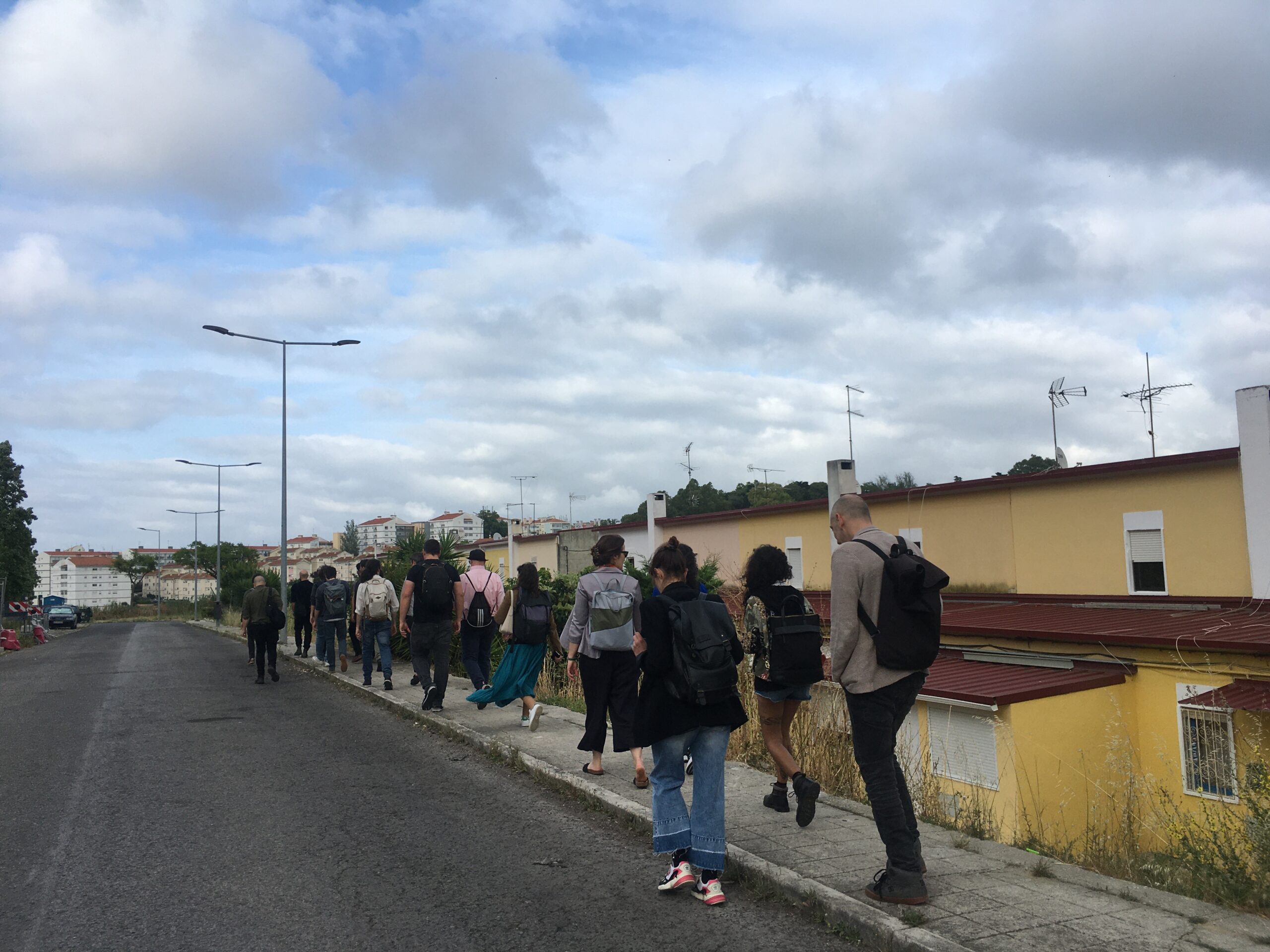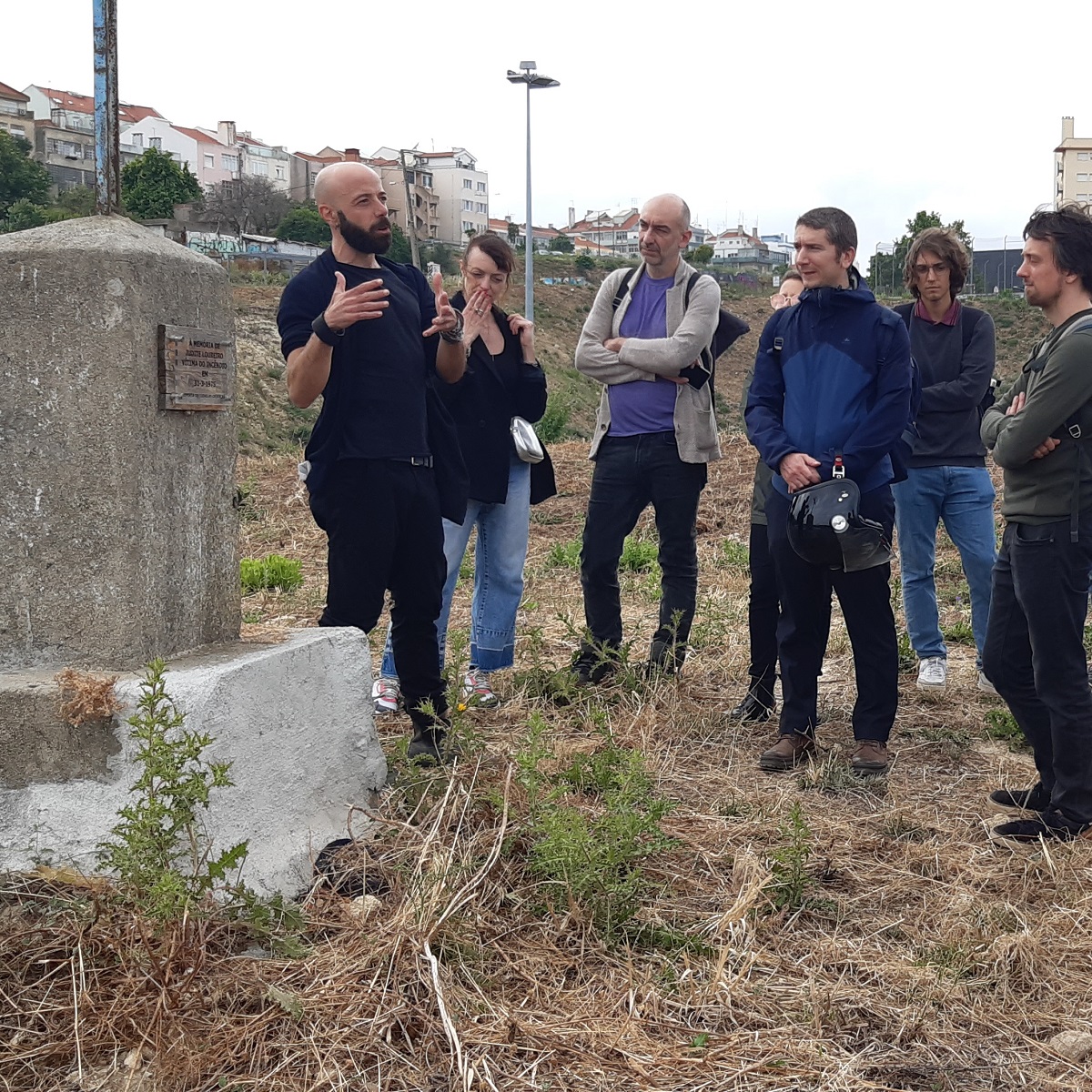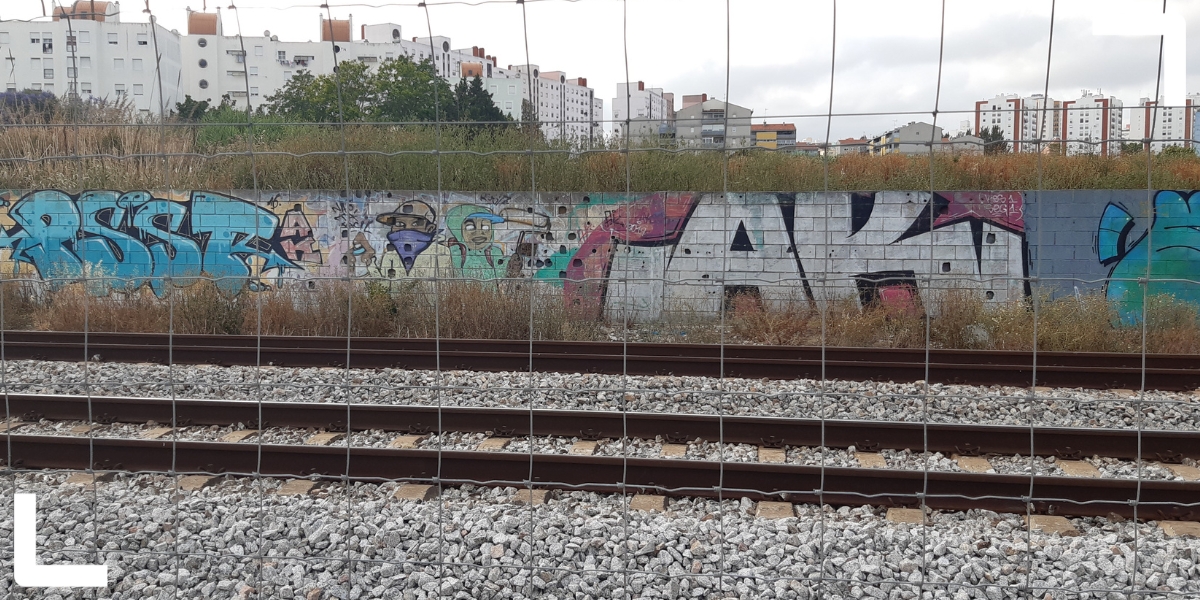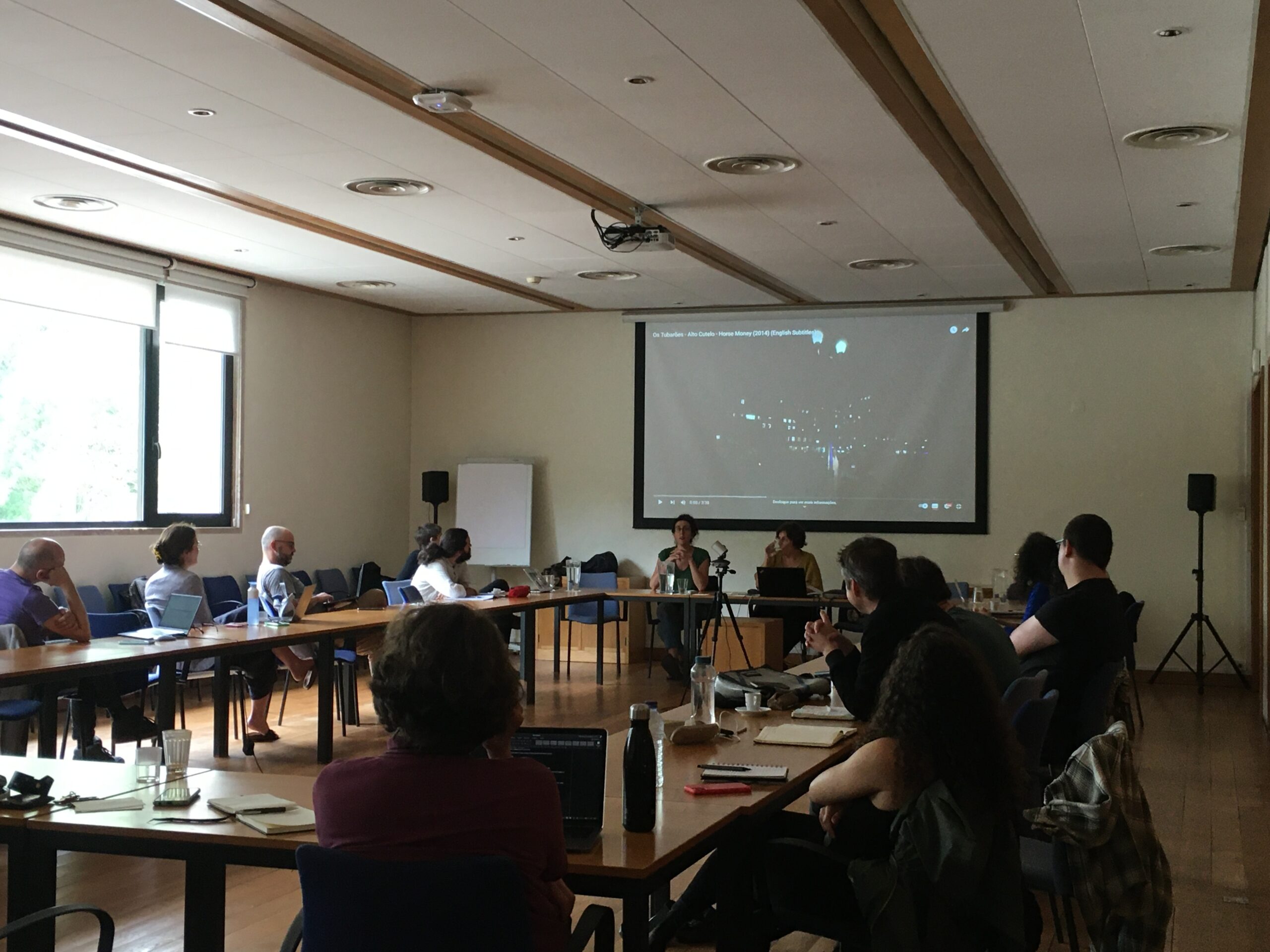What makes urban life worth living? With cities across the world epitomising economic drivers of development and transformation, worth and value in relation to the urban have generally been conceptualised in monetary terms.
But how does liveability interact with the subjective needs and experiences of city dwellers, and to what extent is exclusion an inherent part of urban pathology under global capitalism? What do cities become if we depart from value as a monetary qualifier of worth? And what discoveries will we make if we integrate history and relationality in understandings of what cities are, and what being urban is?
This blog post ponders these questions in relation to presentations, discussions and interactions that took place at the “What makes urban life worth living? (Re)evaluating the value of urban life” workshop, hosted in May 2023 by Dinamia’CET (ISCTE-IUL) and the Urban Transitions Hub (ICS-ULisboa) in Lisbon, Portugal.

Workshop participants walking through Bairro Carlos Botelho, Beato. Photo credit: Lavínia Pereira
The metaphysics of cities
Bringing together researchers from across the social sciences and beyond, the first part of the workshop was structured around participants’ presentations and keynote lectures that cut across themes and geographies. The papers presented consisted of exploratory pieces as well as developed projects and ideas. Sessions explored urban theory through critical perspectives, discussions around urban struggles for survival and change, and urban culture through explorations of public space as sites of contestation and conflict.
Central to these discussions was an interest in investigating the metaphysical characteristics of cities, starting with a deep-dive into the philosophical foundations of human settlements as intricately linked to economic activity and exchange. The discussions that followed revolved around the importance of understanding urban spaces through both a sociological and a political and economic lens, the need to problematise urban governance in relation to the state and policing, the centrality of cities in market systems, and the value of critically examining how exercising our inherent right to the city is often tied to consumerism as an impartial part of urban life.
Key issues raised during these sessions also included the role of the built environment in the production of public spaces, conceptual openings around moral values, moral economies, studying urban areas as sites of boredom, urban liveability under conditions of austerity, the relationship between cities and rural areas, and the role of art as a source of commonality and cultural expression across urban communities.

Andrea Pavoni speaking to workshop participants next to a memorial cross at Penha de França. Photo credit: Elizabeth Dessie
Neighbourhoods, surrounds and derivative futures
A micro-workshop plunged into the many themes covered in the first day’s discussions, structured around questions related to housing, markets and the state. Departing from a theoretical exploration of AbdouMaliq Simone’s concept of the surrounds – defined as “urban spaces beyond control and capture that exist as a locus of rebellion and invention” – Irene Peano asked how extensions are challenged and recreated through research in cities. She explored how this process disrupts ideas of worth and value in relation to urban areas by rethinking notions of urban majorities, and infrastructures of vitality and resilience. Highlighting the importance of conceptual experimentation, Peano’s talk drew on examples from the global South and the global North – including her own research on migrant lives in Italy – to emphasise how identities are inhabited by individuals and communities in efforts to challenge racialised, gendered, heteronormative and broader frameworks of oppression.
The idea of the city as a site of struggle was also central to a talk by Simone Frangella. Exploring the territorialities of belonging, Frangella took workshop participants on a theoretical journey through postcoloniality in relation to the cultural production of certain neighbourhoods in Lisbon. She discussed her research on intergenerational mobility, the repatriation of colonial settlers to Portugal following independence, and how these movements across place and time produced specific residential patterns and cultural narratives. Introducing the concept of “homing” as a useful tool in understanding conviviality in relation to the history of the built environment in cities, Frangella explored the symbolism of place and memory in understanding the history – and the present – of marginalised neighbourhoods.
Ana Rita Alves during a screening of a short film shown as part of her talk. Photo credit: Lavínia Pereira
Building on notions of oppression and cultural production, Ana Rita Alves offered a deep-dive into her research on economically-driven and racialised forms of governmentality enforced by the Portuguese state. She described how tactics that legitimise household evictions are intimately linked to state violence and surveillance. Discussing rehousing initiatives that lead to abysmal losses of income generation and social capital, Alves highlighted housing insecurity as a deeply racialised experience of the city – resulting in lived realities that stand in contrast to housing as a basic human right, with residential segregation and generational patterns of dispossession.
A closing session led by Erik Bordeleau delved into the web of artificial intelligence and financial derivatives. Drawing on his research, Bordeleau emphasised the role of financial technology in redefining value as hard currency and liquidity. He highlighted new technological interventions and the ways in which fintech is redesigning how cities operate as financial nodes of the global capitalist system.
Urbanity as (non)normativity
In addressing the question at the heart of this workshop, many others were raised, opening new windows of enquiry about the value and worth of urban life, about cities and about whose lives and experiences of urbanity “count”. During a walk through Lisbon on the final day of the workshop – which included visits to underserviced and historically marginalised neighbourhoods both in the city centre and its peripheries – thoughts around the blurry lines between illegality and informality were shared. This led to reflections on the permanence of uncertainty, how being stuck in spaces of transition can turn into generational legacies, about the temporal and spatial linkages between urban interventions aimed at renewing and reviving urban areas, and precarity and marginalisation.
By demonetising, instead of devalorising, “worth” as a concept, we allow ourselves to understand the city outside of the extractive processes attached to the use of land, time and labour. Instead, we observe the urban as an ecosystem that experiences its own cycles of disintegration and renewal. This workshop allowed participants to explore the extent to which normativity is rooted in our understandings of what the city is and in what it should be – heightening our understanding of inequality and exclusion as inherent manifestations of being urban under a capitalist global structure.
There is no definitive answer to the question of what makes urban life worth living. But through the nuances of diverse disciplinary perspectives, we can better understand the production and reproduction of urban life as a collectively gained and claimed resource, that is (re)made through the everyday practices of urban dwellers – including those structurally driven to the margins.
Dinamia’CET and the Urban Transitions Hub’s international workshop, “What makes urban life work living? (Re)evaluating the value of urban life”, was held on 25–26 May 2023. The event was hosted at ISCTE-IUL and the University of Lisbon’s Institute of Social Sciences and organised by Andrea Pavoni (ISCTE) and Lavínia Pereira (ICS).
Header photo credit: Elizabeth Dessie. Graffiti artwork in the neighbourhood of Marvila in Lisbon, Portugal.
Note: This article presents the views of the author featured and does not necessarily represent the views of the African Cities Research Consortium as a whole.
The African Cities blog is licensed under Creative Commons Attribution-NonCommercial-NoDerivatives 4.0 International (CC BY-NC-ND 4.0), which means you are welcome to repost this content as long as you provide full credit and a link to this original post.



